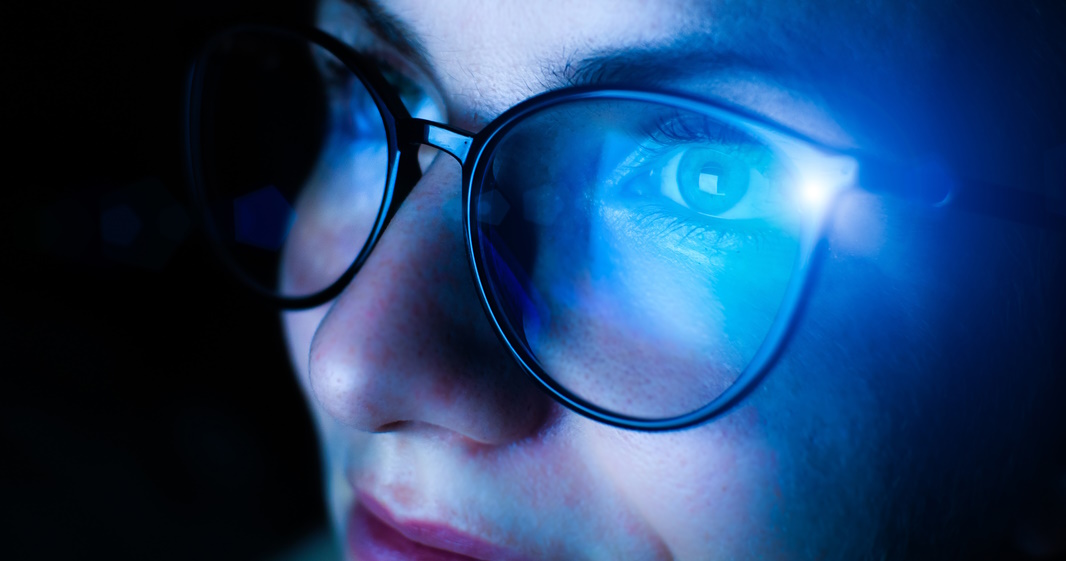An Individual Vision Plan from Vision Care Direct Can Give You Access to Eyewear for Filtering Out Blue Light
Light’s powerful impact can’t be denied. It can influence our energy and mood and is essential to our circadian rhythm – the internal process that regulates our sleep-wake cycle.
However, too much of the wrong type of light can adversely affect our health. We’re spending more time than ever looking at electronic devices, increasing our exposure to blue light. And at night, this can result not only in trouble falling asleep, but overall poor sleep quality, contributing to more daytime fatigue.
If blue light is disrupting our sleep schedules then what’s it doing to our eyes?
Of course, everyone’s eyes are different, and you’ll want to consult with an eye care provider through your individual vision plan to determine how blue light could affect your eyes specifically. Let’s take a closer look at what we do know, though.
What Is Blue Light?
On the visible light spectrum, blue light is the high-energy wavelength closest to the non-visible ultraviolet light. UV light is already known to be harmful to our eyes, with most eyeglasses, sunglasses, and even many contact lenses including built-in protection.
As the name implies, blue light appears to have a bluish hue. However, it can still be present when light is perceived as another color, like white.
The sun is the largest source of blue light. But with so many advances in technology over the years, we’re also encountering it through smartphones, computer monitors, TV screens, and LED light bulbs.
Although these sources emit lower intensities of blue light than the sun, we’re exposing ourselves to them for longer periods of time at much closer distances.
Because of blue light’s proximity to ultraviolet light on the spectrum, there’s growing concern among eye care professionals about its long-term effects.
How Blue Light Is Impacting Our Eyes
Less is known about blue light than ultraviolet light, and research remains ongoing to determine just how much is too much and if it relates to any eye diseases. Right now, there’s no concrete evidence that directly links blue light from digital devices to eye conditions.
Most of the discomfort you experience while staring at your computer for a prolonged period is due to intense eye focus. We tend to blink less when looking at a screen, resulting in eye strain and dry eyes.
That being said, an animal study indicated that excessive blue light exposure could be harmful to retinal cells. Damage to the retina – the light-sensitive layer of tissue at the back of the eye – can lead to vision problems like age-related macular degeneration and ultimately vision loss.
With this in mind, it’s important to have an individual vision plan in place, so you can take advantage of vision services for monitoring and improving your eye health.
Eye Care Tips to Reduce Blue Light Exposure
As blue light’s effects continue to be researched, we’ll have a better understanding of if there’s cumulative damage as a result of regular exposure. There are a few things you can do to protect your eyes in the meantime, though.
- Practice the 20-20-20 Rule: When using an electronic device, this rule gives your eyes a short break to minimize strain. Every 20 minutes, look away from your screen for 20 seconds while focusing on something 20 feet away. When you’re in the groove, this can be a challenge to do consistently, so set a timer for yourself if that’s helpful.
- Use Artificial Tears: Because eyes are more prone to drying out with increased screen time, lubricating eye drops can come in handy.
- Get Blue Light-Filtering Screen Protectors: These can be used on computers, tablets, and phones to help block blue light, while also offering an added layer of protection to your screens. Many devices also include blue light filtering options in the display settings.
- Steer Clear of Screens at Night: You can reduce the effects of blue light on your sleep routine by avoiding bright screens for at least two to three hours before you go to bed.
- Wear Blue Light Glasses: This eyewear is made with a special lens treatment to filter out blue light and ease eye strain. Adding glare-reducing and anti-reflective coatings can help as well. Make sure to talk to your doctor first to see what lens options are right for you.
Keep Your Eyes in Check with an Individual Vision Plan from Vision Care Direct
While there’s still a lot to learn about blue light, one thing is for sure: an individual vision plan is essential to proper eye care at any age.
At Vision Care Direct, we’re different from eye insurance companies. Traditional individual vision care insurance is complex and full of unnecessary industry jargon. We’ve cut through the confusion with vision services plans that are simple, flexible, and affordable – whether you’re looking for coverage for just yourself or the whole family.
Our Exam Only, Materials Only, and Exam + Materials plans are straightforward and designed to get you the exact care you need. The Materials Only and Exam + Materials plans even come with a frame allowance, helping you save on eyewear like blue-light-blocking glasses.
On top of that, our VCD PLUS benefit gives you access to upgrades including an anti-reflection coating and progressive lenses at no additional cost. Just look for the VCD PLUS logo when you’re searching for providers near you on our website.
To learn more about our individual vision plans, visit our Members page. Or speak to one of our friendly customer service representatives by calling (877) 488-8900 from 8 a.m. to 5 p.m. CST Monday through Thursday or 8 a.m. to 4 p.m. CST on Fridays.
